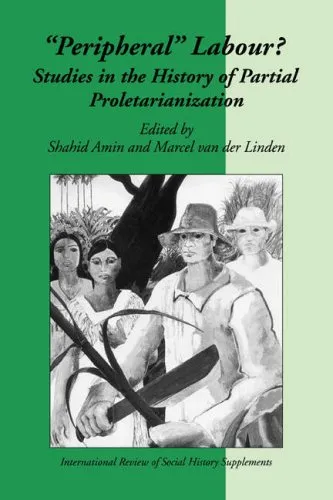Peripheral Labour: Studies in the History of Partial Proletarianization (International Review of Social History Supplements)
4.3
Reviews from our users

You Can Ask your questions from this book's AI after Login
Each download or ask from book AI costs 2 points. To earn more free points, please visit the Points Guide Page and complete some valuable actions.Related Refrences:
Peripheral Labour: Studies in the History of Partial Proletarianization offers a nuanced perspective on the complex dynamics of labor and capital in the developing world. Written by Shahid Amin and Marcel van der Linden, this book is a profound exploration of how partial proletarianization has historically unfolded across different regions. Featuring a collection of essays grounded in economic, cultural, and political analysis, this work provides fascinating insights into the interplay between labor systems and societal structures.
Detailed Summary
The book examines the concept of partial proletarianization, a process through which individuals and communities engage in wage labor intermittently while maintaining other forms of traditional labor or subsistence activities. It is a crucial scholarly resource for understanding how labor is increasingly precarious and multidimensional in today’s global economy. The book is structured into essays, each of which offers case studies from various regions, including Asia, Africa, and Latin America. These essays illuminate the historical contexts and economic conditions that give rise to partial proletarianization, providing readers with a comprehensive understanding of how labor markets are formed and transformed.
By dissecting the notion of "peripherality" in global economic systems, the authors argue that partial proletarianization is not merely a byproduct of underdevelopment but rather a fundamental characteristic of capitalist development at its margins. The essays contribute to a broader discourse on the ways in which economic and cultural factors have shaped labor relations, challenging dominant narratives that often neglect peripheral regions.
Key Takeaways
- The idea of partial proletarianization challenges the traditional Marxist notion of a full transition to wage labor, highlighting the persistence of mixed economic systems in the developing world.
- Peripheral Labour provides detailed case studies that reveal the economic, social, and cultural intricacies affecting labor systems in various historical contexts.
- The book underscores the role of local traditions and cultures in shaping labor practices, deviating from generalized global economic models.
- It offers a critical perspective on globalization, indicating that integration into the global economy does not result in uniform labor relations or complete proletarianization.
Famous Quotes from the Book
"Understanding the history of labor at the margins allows us to reframe the core assumptions of economic development and modernization."
"Partial proletarianization is not an aberration but a manifestation of the broader capitalist system, interacting uniquely with local conditions."
Why This Book Matters
'Peripheral Labour' is a crucial text for historians, economists, and social scientists interested in the global complexities of labor markets. Its analytical depth and regional focus offer invaluable insights into how economic systems work beyond core capitalist countries. The book refutes simplified conceptions of labor development, instead presenting a world where diverse economic activities coexist and interact with wage labor. This scholarly work contributes significantly to the discourse on economic globalization, encouraging a rethinking of the pathways taken by different societies within the global economy. By focusing on "peripheral" regions, this book challenges readers to reconsider what is assumed to be the norm in economic development.
Free Direct Download
You Can Download this book after Login
Accessing books through legal platforms and public libraries not only supports the rights of authors and publishers but also contributes to the sustainability of reading culture. Before downloading, please take a moment to consider these options.
Find this book on other platforms:
WorldCat helps you find books in libraries worldwide.
See ratings, reviews, and discussions on Goodreads.
Find and buy rare or used books on AbeBooks.
1243
بازدید4.3
امتیاز50
نظر98%
رضایتReviews:
4.3
Based on 0 users review
"کیفیت چاپ عالی بود، خیلی راضیام"



